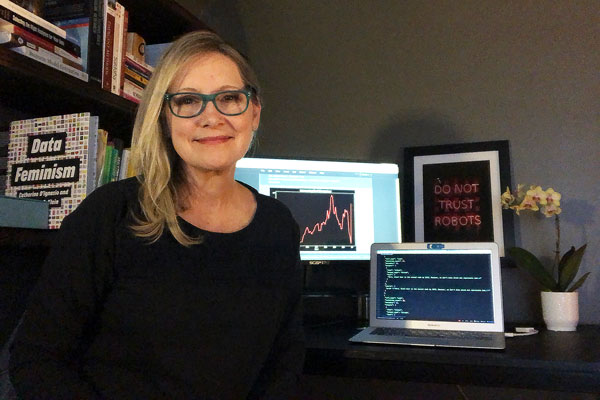Why do you love social computing?
It touches on nearly everything about online technologies — how we live, work, share, and play.
In the classroom and in my research, we explore socially intelligent computing, or how to build programs and data systems with a human-centered focus to minimize harms due to bias or misinterpretations.
Why Naz?
I joined Nazareth in fall 2020 to help launch three new majors:
My classes are project-based and very hands-on. So students have a lot of freedom to explore their own interests and data questions using datasets about music, movies, comics, the environment, and social indicators.
Favorite course?
Data science is actually a very creative endeavor, which surprises a lot of students. I love teaching programming to newcomers because, for most students, it is their very first time learning to code.
Everyone is so supportive of one another and we have so much fun because we’re all in it together. The projects are really impressive too. The class is designed so students can use their class projects as portfolio items when applying to internships and jobs to showcase their practical programming and problem-solving skills. Among the courses I teach:
- Programming & Problem Solving
- Introduction to AI & Machine Learning
- Equitable Approaches to Big Data Analysis
- Data Visualization
How do you engage students?
Giving students a big say in how they develop their own projects is such a thrill. To see them think through really hard societal problems and develop creative ways to build knowledge is very rewarding and gives me a lot of hope for our future.
For example, a student coded a program to analyze coral reef data across the world. She used a computational approach called data sonification which assigns a musical tone to represent each data point. This way, we can both hear and visualize the data as an interesting new way to track the health of a reef over time.
Fun fact
I lived on a very small island in the South Pacific as a Peace Corps Response volunteer in The Republic of Vanuatu. This area on the ring of fire is considered the world’s most at-risk country for natural hazards. Vanuatu faces threats from cyclones, earthquakes, tsunamis, sea-level rise due to climate change, and even volcanoes. It was here that I developed my interest in researching humanitarian crisis response.
AI Institute
Wendy Norris is among the core faculty in Nazareth's Institute for Responsible Technology (IRT).
Prospective students: Learn more about how you can study ethics and AI at Nazareth »
Student View
"Prof. Norris is excellent at breaking down larger, overarching concepts of data science into smaller pieces that make learning much more manageable and fun, especially for those who may not have much experience with the subject matter," said Louise Ly '15, '21G, while earning a master's in higher education student affairs administration.
"In my Computer Programming class with her, she introduced projects within each module that built upon the previous module. So we were never starting from scratch, and we could practice the skills we were learning. Each student had different outcomes for their final projects because we were allowed the freedom to ask questions of the data that were interesting to us as a person, but still exercised the same skill sets we gained in class."

Machine Learning as an Emerging Social Justice Tool
"How we talk about refugees matters," says Prof. Wendy Norris, director of Nazareth's ethical data science program. She's using machine learning to research how news accounts and social media posts describe refugee crises.
More
Research, teaching background: wendynorris.com
FACULTY SPOTLIGHTS
Wondering who else you can learn from — and who will support and challenge you? Check out more Faculty Spotlights.